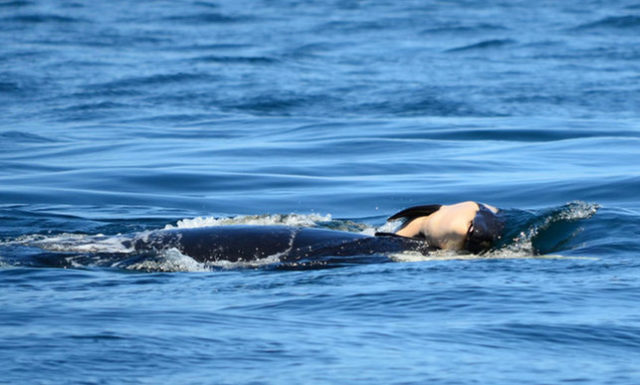
This week the Center for Whale Research (based out of Washington State) reported the death of a newborn Southern Resident killer whale (SRKW) calf which died a short time after it was born near Victoria, BC on Tuesday July 24.
The newborn whale was reported alive and swimming with its mother, J35, and other members of J-pod near Clover Point on the Victoria shoreline in mid-morning. A Center for Whale Research (CWR) team was on the water in Haro Strait at the time and immediately responded to photo-document the newborn calf for the long-term census study that the Center for Whale Research maintains for the US and Canadian governments.
Unfortunately, by the time the CWR crew arrived on scene, the newborn calf was deceased, and the pod had traveled several miles eastward of the reported sighting location. The baby’s carcass was sinking and being repeatedly retrieved by the mother who was supporting it on her forehead and pushing it in choppy seas toward San Juan Island, USA. The mother continued supporting and pushing the dead baby whale throughout the day until at least sunset.
A resident of San Juan Island near Eagle Cove reported: “At sunset, a group of 5 to 6 females gathered at the mouth of the cove in a close, tight-knit circle, staying at the surface in a harmonious circular motion for nearly 2 hours. As the light dimmed, I was able to watch them continue what seemed to be a ritual or ceremony. They stayed directly centered in the moonbeam, even as it moved. The light was too dim to see if the baby was still being kept afloat. It was both sad and special to witness this behavior.”
As of sunset last night, July 25, J35 was still pushing the dead calf near East Point, Saturna Island. Killer whales and dolphins have been known to support and transport their dead calves for as long as a week – a testament to the amazingly strong mother/offspring bond and caring.
The newborn orca will not be given an alpha-numeric designation as a member of the SRKW population because it did not survive long enough to demonstrate its viability. Approximately 75% of newborns in the recent two decades following designation of the Southern Resident killer whale population as “Endangered” have not survived, and 100% of the pregnancies in the past three years have failed to produce viable offspring. The Department of Commerce, NOAA Fisheries, has designated the SRKW population as a “Species in the Spotlight” due to its imminent threat of extinction.
The SRKW population decline and poor reproduction is thought to be food related, given that populations of Chinook salmon (primary prey for the SRKW) seem to be challenged.
The American Fisheries Society in its landmark publication “Salmon 2100” indicates that changes in core policy drivers are required if wild salmon are to survive this century. “It follows that these same core policy changes are required to save the whales,” says CWR. Hatchery salmon are considered inferior for whale consumption and not sustainable.


